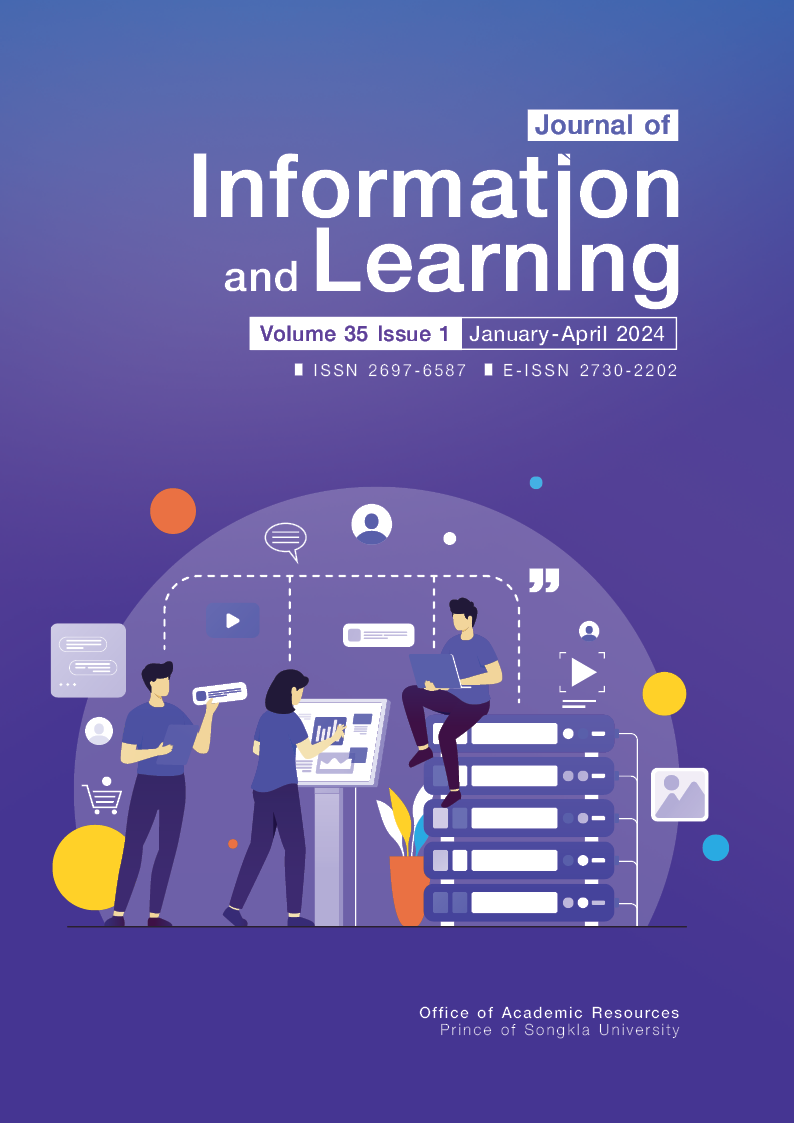Development of a Massive Open Online Course (MOOC) based on Connectivism on Emerging Educational Technology and Communications in Education to Enhance Learning Achievement of Learners
Main Article Content
Abstract
The research objectives were 1) to develop a MOOC based on connectivism focusing on Emerging Educational Technology and Communications in Education, and 2) to compare learners' pre-test and post-test performance enrolled in the course. The sample consisted of 45 students registered in the PSU MOOC system for the subject Emerging Educational Technology and Communications in Education, selected using simple random sampling. The research tools included online lesson content, learning management plans, a MOOC, and learning achievement tests. Data were analyzed using mean, standard deviation, and single-group hypothesis testing. The research findings revealed that the quality of the developed MOOC was at the highest level (M = 4.83, SD = 0.30), and that students who studied with the MOOC based on connectivism demonstrated significantly improved achievement levels after completing the course, at a statistical significance level of .01.
Article Details

This work is licensed under a Creative Commons Attribution-NonCommercial-NoDerivatives 4.0 International License.
The Journal of Information and Learning is operated by the Office of Academic Resources, Prince of Songkla University. All articles published in the journal are protected by Thailand copyright law. This copyright covers the exclusive rights to share, reproduce and distribute the article, including in electronic forms, reprints, translations, photographic reproductions, or similar. Authors own copyrights in the works they have created as well as the Office of Academic Resources. The Journal reserves the right to edit the language of papers accepted for publication for clarity and correctness, as well as to make formal changes to ensure compliance with the journal's guidelines. All authors must take public responsibility for the content of their paper.
References
Boonkate, W., Pheeraphan, N., & Pradubwate, R. (2022). The development of learning management model and instruments for promoting adversity quotient in the context of the digital age by using the concept of connectivism for undergraduate students with different personalitie. Journal of Social Science and Buddhistic Anthropology, 7(5), 194-211. https://so04.tci-thaijo.org/index.php/JSBA/article/view/256651
Jirasophin, L. (2021). The development of a massive open online course on go and business thinking skills development subject. Panyapiwat Journal, 13(3), 213-225. https://so05.tci-thaijo.org/index.php/pimjournal/article/view/251693
Kulpradit, Y., Jiravarapong, B., Sengsri, S., & Bunchongchit, K. (2019). A development of an instructional system on small private online course for general education course for naresuan university. Journal of Education Naresuan University, 21(4), 254-270. https://so06.tci-thaijo.org/index.php/edujournal_nu/article/view/92350
Napapongs, W. (2009). The research in educational technology and innovation. Pattani Karnchang.
Nitisak, W., & Pattanasit, S. (2014). Development of instructional model via internet on connectivism for student university of life project, Chaiyaphum Rajabhat University. Sripatum Chonburi Academic Journal, 12(2), 104-113. https://www.chonburi.spu.ac.th/journal/booksearch/upload/1470-011_development.pdf
Phayakkhadach, P., & Jongkong, S. (2019). Connectivism a study of learning outcomes on the creativity with globalization unit of grade 11 students by using cippa model and connectivism learning theory. Journal of Education, 30(1), 104-114. https://ojs.lib.buu.ac.th/index.php/education2/article/view/5942
Promta, U., & Wongsa, S. (2018). Effects of the instructional management using the flipped classroom modeltogether with lessons on social networks in the‘self-actualization for teachers’ course. Nakhon Phanom University Journal, 8(3), 34-42. https://so03.tci-thaijo.org/index.php/npuj/article/view/151761
Rathachatranon, W. (2019). Determining an appropriate sample size for social science research: The myth of using Taro Yamane and Krejcie & Morgan method. Journal of Interdisciplinary Research: Graduate Studies, 8(Special), 11-28. https://so03.tci-thaijo.org/index.php/JIRGS/article/view/243621
Ruamkaew, K., Simmatun, P., & Samavardhanae, K. (2016). Open learning model base on connectivism for enhancing the undergraduate students’ creative thinking. Prae-wa Kalasin Journal of Kalasin University, 3(1), 45-63. https://so05.tci-thaijo.org/index.php/Praewa-ksu_Journal/article/view/89438
Sonseeda, A., & Chanla, W. (2017). Roles of information and communication technology to education. Journal of Kasetsart Educational Review, 32(2), 1-5. https://so04.tci-thaijo.org/index.php/eduku/article/view/246554
Tinnawas, N., & Thammetar, T. (2016). The study of massive open online course model for thai higher education. Veridian E-Journal, Silpakorn University, 9(3), 1463-1479. https://he02.tci-thaijo.org/index.php/Veridian-E-Journal/article/view/75698
Yingpratanporn, H., Pattanasit, S., & Srifa, P. (2021). Learning model based on connectivism and cognitive neuroscience on application to enhance analytical thinking for undergraduate students. Journal of Graduate Studies Valaya Alongkorn Rajabhat University, 15(2), 224-235. https://so02.tci-thaijo.org/index.php/JournalGradVRU/article/view/242825


